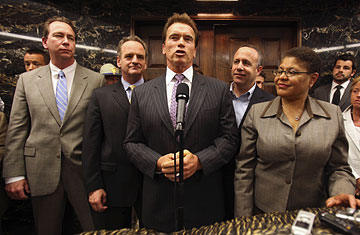
California Governor Arnold Schwarzenegger, center, discusses the compromise that was reached on July 20, 2009, to resolve the state's $26.3 billion budget deficit in Sacramento
Is this the deal to save California — or shrivel it? Governor Arnold Schwarzenegger and legislative leaders announced a budget deal on July 20 that closes the state's staggering $26.3 billion budget shortfall with just as staggering cuts that will profoundly reduce state government and a broad array of programs. "We have come to a basic agreement that, of course, has to be ratified by the legislature," said Schwarzenegger, a Republican, who volunteered that Monday's five-hour negotiations were "like a suspense movie." But Democratic senate leader Darrell Steinberg was mournful: "This is a sober time. We have cut and we have cut in many areas that matter to real people."
Indeed, the cuts will be severe, and the Golden State that Governors Earl Warren and Pat Brown built in the middle of the past century will be further damaged. Local community governments, already hard-pressed by the recession and lower revenues, will now lose at least $2 billion to the state with the promise to repay when the fiscal situation improves. The higher-education system, including the University of California, is being hit by $2 billion in cuts. The public schools, already struggling with large class sizes and less technical and support services, must cut an additional $9.5 billion and will lose thousands of teachers and staff. Tens of thousands of seniors and children will lose access to health care at a time when the national government is debating universal health coverage. The entire state workforce, except forest-fire crews and the California Highway Patrol, is on a mandatory three-day furlough each month.
"There is great concern about the magnitude of these reductions," says Jean Ross, executive director of the California Budget Project, a liberal think tank. "This budget does not reflect the priorities of a vast majority of California voters, and these cuts threaten California's most vulnerable children and families during the greatest economic downturn since the Great Depression."
But Schwarzenegger had to act. He knows all about the political risks involved in budget crises: he rode to victory in a recall election when his predecessor, Governor Gray Davis, was hamstrung by a similar budget crisis in 2003. And this crisis has been a bad one: on July 2, as the talks stalemated, California began issuing IOUs to its creditors.
Whether it was his intention or not, Schwarzenegger has used the fiscal crisis to give California a new social contract. While many of the details of the agreement have yet to be released, he and his fellow Republicans, who form a minority in the legislature, achieved their goal of standing firm against using tax increases to close the towering deficit, forcing Democrats to accept more-stringent requirements for a number of social programs, including welfare-to-work and in-home health care. Schwarzenegger and his Republican allies successfully resisted calls from Democrats to raise taxes by saying they had agreed to a $12 billion tax increase in February as part of the state's first budget crisis of 2009, and that in a severe economic downturn, businesses and individuals could not afford any more taxes.
Democrats were able to block Schwarzenegger from using the budget crisis to eliminate California's safety net for its poorest and most vulnerable citizens. The governor had originally proposed eliminating the state's welfare-to-work program, the CalGrant program that helps thousands of low-income students attend college and a health-insurance program covering poor children.
That is small comfort. The raid on local government finances has enraged many city and county leaders. Los Angeles County Supervisor Zev Yaroslavsky said, "For the state to balance its books on the backs of local government is bad public policy, morally bankrupt, and does not solve the state's problem. What happens next year? Will they come after local government again?"
